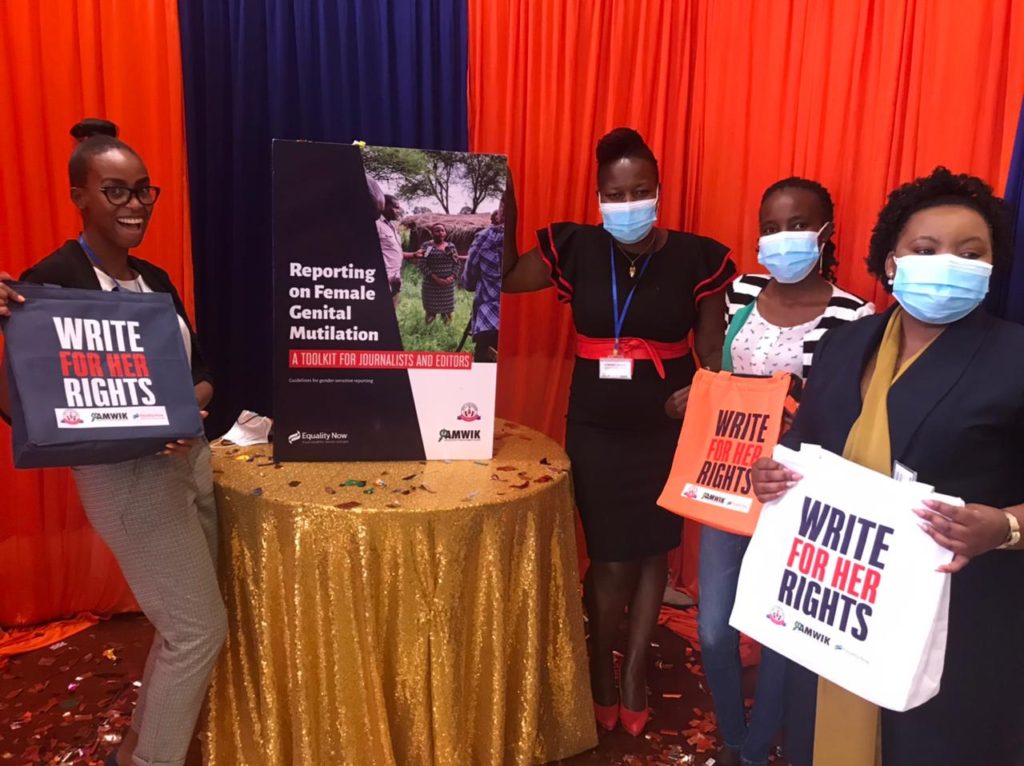NAIROBI, Kenya, Mar 29-An Anti-Female Genital Mutilation toolkit that lays out ethical, survivor-centred principles aimed at enhancing the coverage of the vice by the media in Kenya whilst promoting responsible reporting, has been launched.
The robust and comprehensive toolkit seeks to provide journalists with easy-to-reference anti FGM guidelines for the reportage of FGM.
The toolkit which was developed by lobby group, Equality Now, will ultimately contribute to the anti FGM campaign in Kenya by furnishing all cadres of media personnel with adaptable resources on addressing FGM.
The lobby group partnered with the Anti-Female Genital Mutilation Board (Anti FGM Board) and Association of Media Women in Kenya (AMWIK) to develop the toolkit.
Speaking during the launch in Nairobi, Anti FGM Board Chief Executive Bernadette Loloju noted that the media played a critical role in increasing the public’s understanding of social issues including FGM.
She acknowledged that reporting on FGM required a proper understanding of the issues surrounding the complexities of the practice and said that the toolkit was particularly timely as Kenya had committed to end this harmful practice by 2022.
“I believe that this toolkit will be a useful guide to journalists practicing in Kenya and beyond and that it will go a long way in assisting them file their anti FGM reports responsibly and in a manner that helps the public to understand why the country needs to end FGM,” she said.
“Applying the principles of Do No Harm that this toolkit provides, will further go a long way in helping media professionals to be mindful of survivors and to protect them and their families from the re-violation of their rights.”
Equality Now Director Africa Office, Faiza Mohamed, lauded the media for moving the dial in the fight against FGM in Kenya saying that the media was a critical ally to the campaign to end FGM in Kenya.
She implored the sector to play their part in holding the government to account on its commitment to end FGM while at the same time amplifying survivor voices through a gender-sensitive lens.
“Responsible reporting can improve public awareness, shift audiences’ perceptions, and promote remedies. The media amplifies the voices for those who would otherwise be silenced, exposes institutional gaps which allow women and girls to be harmed in the name of tradition, and helps them to access the necessary support,” she said.
“However, alongside drawing much needed attention to FGM, media professionals have a responsibility to ensure that their reporting does not expose the vulnerable ones to further harm or risk.”
AMWIK’s Executive Director Marceline Nyambala added that it was important for Kenya to ensure that no one was left behind in the campaign to end FGM.
She challenged the media to ensure that their reports did not alienate or castigate communities where FGM was prevalent as it would lead to the discrimination of these communities.
“With the right information, the right language and proper framing of FGM as a human rights violation, I am certain that we will end FGM. This manual will help us frame FGM as a harmful cultural practice,” she explained.
Approximately 21 percent of women and girls aged between 15 and 49 years in Kenya have undergone FGM according to the Kenya Demographic Health Survey (2014).
The practice varies across different communities and is almost universal in some communities with prevalence rates as high as 94 percent such as the Somali.
Although Kenya enacted the Prohibition of Female Genital Mutilation Act (2011), which imposes stiff penalties on perpetrators and prohibits cross-border and medicalization of FGM, the practice remains prevalent in some parts of the country as communities come up with ways of circumventing the law.
Instances of cross-border FGM, medicalized FGM and FGM during humanitarian crises such as the COVID-19 pandemic are a threat.
In 2017, a medical professional filed a constitutional petition challenging the constitutionality of this law.
The Kenya High Court however dismissed this petition on 17th March 2021 on grounds that such a move would be detrimental to the rights of women and girls.
The toolkit incorporates journalists’ perspectives on FGM and also guides them on how to engage survivors of FGM.
Want to send us a story? Contact Shahidi News Tel: +254115512797 (Mobile & WhatsApp)


